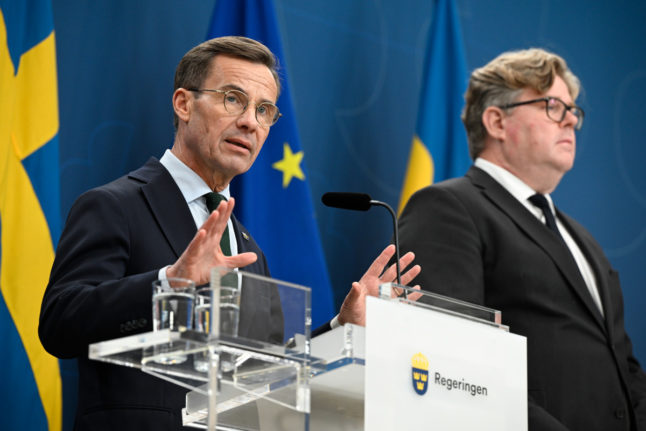The past month has been the bloodiest in a long time in Sweden and it’s different from most of what we’ve ever seen before.
Eleven people shot dead. One woman killed in an explosion.
Thirteen-year-old Milo was found in a forested area in Haninge, south of Stockholm. He had been shot in the head and police believe his body was dumped in the area after he was murdered.
Mogos, 23, was shot dead on his way to work in elderly care in Uppsala. He dreamed of studying law and wasn’t the intended target, just lived on the same address as the relative of a gang leader.
Giovanni, 19, had according to his mother decided he wanted to leave the gang milieu and was laying low in Stockholm to avoid being targeted for running drugs in Gävle on behalf of gang leader Rawa Majid. He was gunned down on the street in the Vasastan area in central Stockholm.
An 18-year-old rapper was killed at a crowded football pitch in Fruängen, southern Stockholm, in the early evening, in front of children and other teenagers who were there for football practice.
Soha, 24, who had graduated as a teacher earlier this summer, died in an explosion north of Uppsala while she slept. She is not believed to have been the intended target, but she happened to be the neighbour of someone who had links to a gang.
The past few weeks have been different to previous waves of gang shootings in Sweden in that so many relatives are being actively targeted – even in cases where they themselves have no known links to gang crime at all. Several innocent bystanders have also been killed.
Three killings in one night this week kicked decision-makers into action. Prime Minister Ulf Kristersson gave a televised address to the nation – something that used to be practically unheard of in Sweden but which his predecessor launched during the Covid crisis – after which he met with the commander-in-chief of the armed forces to discuss what the military can do to help the police.
Social Democrat leader Magdalena Andersson also urged the government to call in the military to assist the police.
This may not seem like a controversial move in countries where the military quite often help the police, but in Sweden there’s long been a resistance to mixing the two – dating back to the an incident in the village of Ådalen in 1931 when the military were called in to help keep a demonstration in check and ended up opening fire on protesters, killing five people.
In reality, there’s not much the Swedish military can do for now to help the police in terms of actively cracking down on gangs with the use of force. The armed forces are already permitted to offer support to other authorities, such as the police, when appropriate, but not if that support puts them in a situation where they would risk having to use force against individuals. The only exception to the use-of-force rule is that police can request military support to fight terrorism, a law that was introduced in 2006, but that doesn’t cover gang violence.
Kristersson knew that when he held a press conference yesterday to announce that he was ordering the armed forces and police to work together to crack down on the gang crime wave, and he also emphasised that this would be done “within the existing legal framework”.
So that could involve help with logistics such as helicopters, or providing staff and knowledge in areas where the armed forces have plenty of expertise, such as help with analysis when it comes to explosives or forensic IT work, but you won’t be seeing soldiers in the street.
In the long term, Kristersson said the law should be changed to give the police authority greater ability to request help in certain situations. He specifically mentioned “grey area situations where it’s not obvious what kind of threat Sweden faces”, but otherwise did not elaborate. Justice Minister Gunnar Strömmer told the same press conference that the government would reveal further details down the road.
“This should have been changed a long time ago,” said Kristersson.
Meanwhile, I’ve been rereading this article about how Sweden could put an end to gang crime in the long term, which looks into some of the measures that are often proposed, some of the measures that have been tried and tested, and what the research says actually works.
In other news
The Local’s Richard Orange and Becky Waterton went to an event in Malmö the other day to listen to Ulf Kristersson and Finance Minister Elisabeth Svantesson. They asked Svantesson whether the government was hostile to foreigners, following cuts to funding for organisations like ABF, which among other things teach Swedish to people who can’t study SFI, and also to ethnic associations.
Svantesson said Sweden was still a “land of possibilities” for immigrants: “I feel very confident, and secure and certain that anyone who truly wants to get on can go extremely far in Sweden.”
Richard also wrote about why Svantesson seems to be the minister most willing to take unpopular measures, after she presented a budget that made enemies on both sides of the political aisle.
Kristersson in his televised speech to the nation blamed most of the gang crime on failed integration. That came just weeks after his government decided to completely scrap funding for ethnic associations, despite research suggesting that they are one of the things that actually facilitates integration as they can help provide a pathway into Swedish society.
There have been a lot of cross-border stories this week, with a new tax agreement drawing close which should boost commuting between Denmark and Sweden, and the signing of a television deal which will bring more cross-Nordic TV shows such as The Bridge to your screens at home.
The Local’s reader Lauren Abston wrote this review of a restaurant which she insists serves the best pizza in Stockholm.
Finally, here’s our monthly list of everything that changes in Sweden in October.
Take care,
Emma Löfgren
Editor, The Local Sweden
Inside Sweden is our weekly newsletter for members that gives you news, analysis and, sometimes, takes you behind the scenes at The Local. It’s published each Saturday and members can receive it directly to your inbox, by going to your newsletter preferences.



 Please whitelist us to continue reading.
Please whitelist us to continue reading.
Member comments